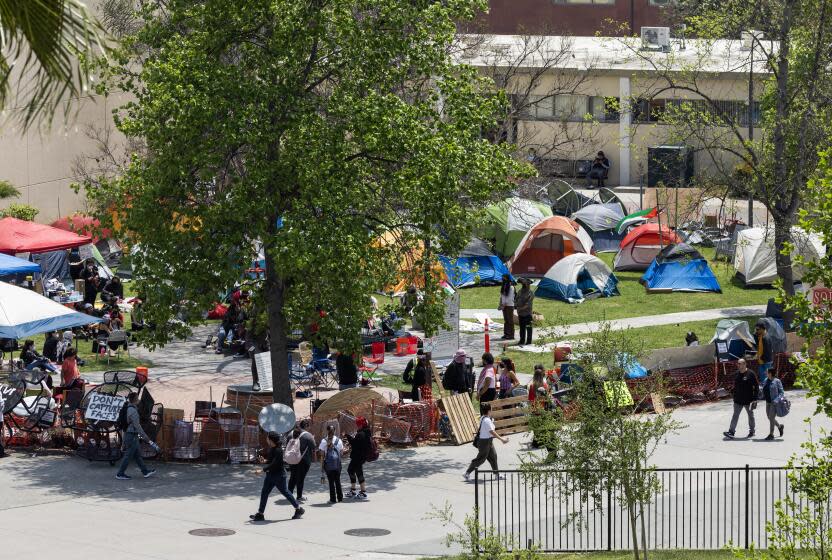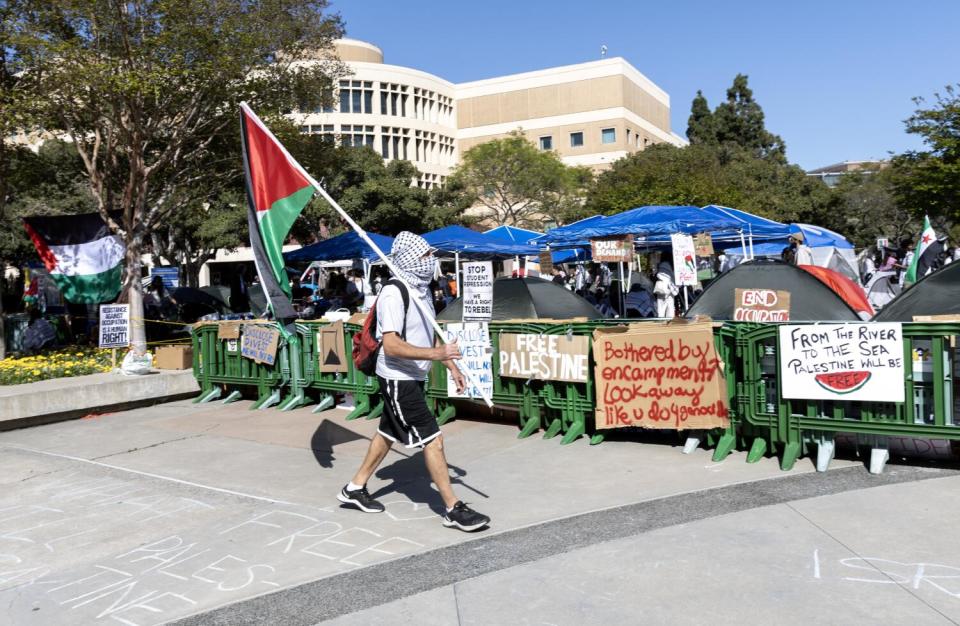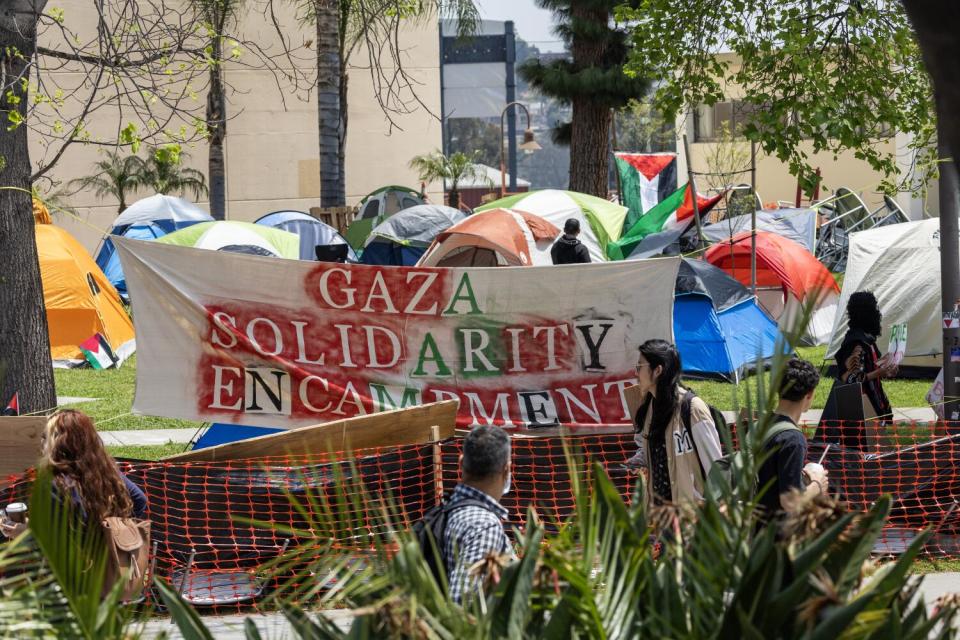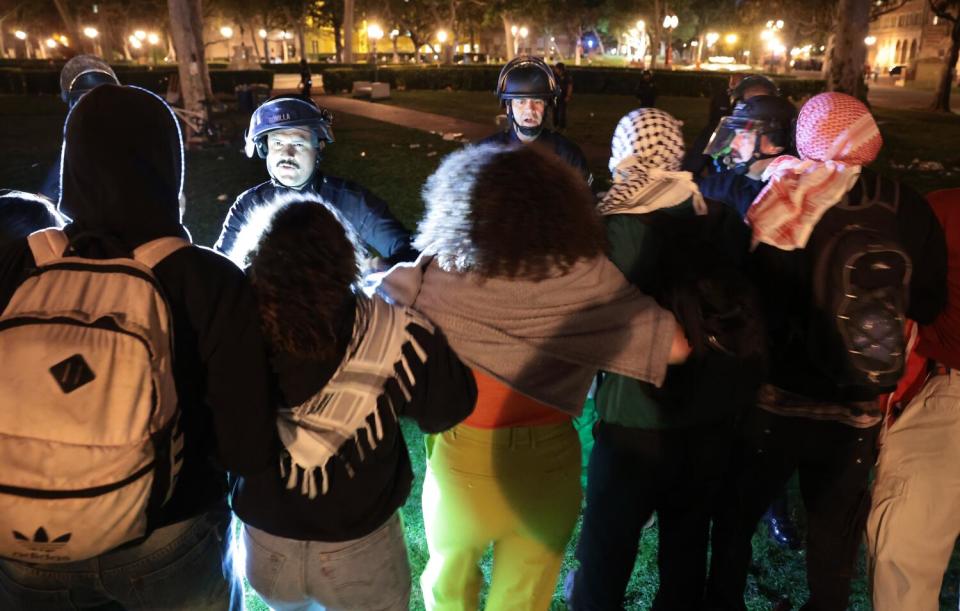Encampments spread across California universities. Are they living on borrowed time?

After police forcibly removed pro-Palestinian encampments at two universities this week, college leaders across California are grappling with how to move forward with protests on other campuses.
The high-profile law enforcement operations that cleared a massive camp at the heart of UCLA and evicted protesters at Cal Poly Humboldt who had occupied buildings were in some ways unique. Elsewhere, the camps and other protests have been smaller and less disruptive.
But pro-Palestinian protesters calling for an end to Israeli military actions in Gaza at other California campuses have vowed to continue their encampments.
And that puts university leaders in a tough spot. College presidents at places like USC, UCLA and Columbia University who have supported the arrests of students have faced a swift backlash from some. Yet the camps have been a source of controversy, especially if they interrupt campus operations.
Some officials have said they are willing to allow the encampments to remain as long as they stay small, orderly and positive. UC Riverside on Friday struck a deal with protesters to end their camp in exchange for concessions. But many campuses have not indicated how tolerant leaders will be.
Tension are also high at USC, where an encampment remains despite earlier arrests.
Read more: Ali: Mocking Gaza protesters as 'gluten-free warriors' was fun — until a mob at UCLA attacked them
At least 25 people were arrested early Tuesday at Cal Poly Humboldt. The same night at UCLA, a large group wearing black outfits and white masks attacked pro-Palestinian protesters, hurling objects and attempting to tear down barricades surrounding the encampment. The violence prompted criticism over the university's handling of the protests.
By Thursday, more than 200 had been arrested after police moved onto UCLA's Westwood campus to push protesters out and begin dismantling the camp.
Encampments remain in full swing at California campuses, including UC Irvine, Occidental College, Sacramento State, San Francisco State and others.
At least two other Southern California colleges — Chapman University and Cal State L.A. — joined the movement last week. Students at Cal State Long Beach held a rally Thursday, but have said there are no plans for an encampment.
Read more: California college campuses become lightning rods for pro-Palestinian protests
UC Riverside
Administrators and pro-Palestinian student organizers reached an agreement to end an encampment on the Riverside campus. The camp, which has been up since April 29 was to have been removed by Friday night.
The college has agreed to form a task force to explore removing the college's funds from UC systemwide investments to manage it in a "financially and ethically sound" manner, according to the agreement.
"It has been my goal to resolve this matter peacefully and I am encouraged by this outcome — which was generated through constructive dialogue," Chancellor Kim Wilcox said in a statement. "This agreement does not change the realities of the war in Gaza, or the need to address antisemitism, Islamophobia, and other forms of bias and discrimination; however, I am grateful that we can have constructive and peaceful conversations on how to address these complex issues."

UC Irvine
Student representatives met with UC Irvine leadership last week to discuss whether the university would agree to their demands for divestment from companies with ties to Israel and weapon manufacturers in exchange for an end to the campus encampment. But talks were not fruitful, according to student organizers.
Protesters have asked for an end to "violent extremism" funding, promised amnesty for student protesters, a commitment to an academic boycott of Israel and removal of what the group calls "Zionist programming."
UC Irvine leaders proposed a meeting between the student organization and college representatives to discuss UCI Foundation investments if protesters agreed not to have any other encampments or rallies on campus — including at commencement — a student organizer said in a video posted Thursday to Instagram.
The student protesters declined.
"UCI Admin proposed a bull— draft proposal and threatened their students and community members with violence, but we, the student movement for Palestine, the UC Intifada from the encampments on campus, are steadfast, we WILL NOT capitulate," the group wrote on Instagram.
Read more: Photos: Clashes at pro-Palestinian demonstrations on California campuses
Campus police handed out citations last week, leading to escalated tensions between officials and protesters. However, the university has not made any moves to dismantle the encampment.
UCI spokesperson Tom Vasich said Friday that officials are "looking to engage in productive conversations with the organization's student leaders to find a solution."
"We always support our students' free speech rights to protest peacefully on campus," he said, "though encampments may also infringe on the academic and research responsibilities of the university."
UC Irvine Chancellor Howard Gillman said in a statement that administrators have reached out to students in “the existing illegal encampment” and have asked them to move. The space they have occupied is in an area where classes are taught and research is conducted, Gillman said.
“We hope that our students and other affiliates do not insist on staying in a space that violates the law, violates our policies and disrupts our mission,” he said.
Read more: At USC, arrests. At UCLA, hands off. Why pro-Palestinian protests have not blown up on UC campuses
Occidental College
Despite the unrest at other colleges, student protesters at Occidental College say they plan to continue their encampment until their demands are met. But they have developed evacuation plans to keep students safe if violence occurs.
“We have identified certain buildings to hide in just in case counterdemonstrators do arrive, and certain points on campus to regroup,” said Matthew Vickers, a co-organizer of the encampment.
Vickers said he's confident that any threats made to the camp will not come from school administration, as the university told organizers it has no plans to call in police.
“Concerns [of safety] are mostly quelled,” he said. “The atmosphere remains pretty joyous and relaxed; however, [safety] is definitely something people are considering.”
Negotiations are ongoing with the college's administration on their demands, which include an emergency trustee meeting to vote on halting investments in Israel and a statement from the college recognizing the genocide and calling for a cease-fire, Vickers said.

Cal State Los Angeles
Students at Cal State L.A. on Wednesday formed an encampment in the campus quad.
Students for Justice in Palestine said in a statement that their demands include the university calling for a cease-fire in Gaza, a promise not to suspend or discipline any protesters, a commitment to an investment audit and pulling all tuition money from any funds related to Israel, and a vow to engage in a boycott of partnerships with universities or institutions that "invest in, support and legitimize the Zionist regime."
"We demand a fully funded, free CSULA and CSU system that is not beholden to Zionist and imperialist private donors," the group said in a statement.
Organizers have vowed to remain on campus until demands are met. Cal State L.A. officials wrote in a statement that the university is continuing to monitor the encampment and that it "values free speech as essential to higher education and a strong democracy."
"We are committed to supporting the rights of students and others to assemble peacefully, to protest and to have their voices heard in a lawful manner that does not pose risks to the safety and well-being of others or to themselves. Our focus is on ensuring that our campus is a safe and welcoming environment," the statement read.
Read more: With remains of UCLA camp tossed in dumpster, Gaza activists assess the future
Chapman University
Roughly 30 students at the private university in Orange formed a tent encampment Thursday in a grassy area between Memorial Hall and Wilkinson Hall.
Duran Aziz, a member of Students for Justice in Palestine, told KABC-TV the group is looking for Chapman "to divest now from companies that profit off the genocide in Gaza."
The encampment at Chapman — one of the more recent in Southern California — does not have barricades around it and the only people allowed to sleep on campus are students.
"It's really very open and people can come and go," said Molly Thrasher, Chapman's director of public relations. "It's peaceful and the dialogue between the administration and students is very open. It's respectful. What we're seeing at other campuses, it's just not how it's unfolding here at Chapman."
Pitzer College
The encampment at Pitzer College in Claremont, which has a student population of just over 1,200, has not seen significant pushback from the college, according to a student organizer.
The camp, which was built more than a week ago, consists of about 35 tents and roughly 40 students.
“The atmosphere is really joyful,” said Pitzer senior Sophie McClain, a co-organizer of the encampment. “We’ve been really lucky that we’ve had limited to no repression from the college.”
Bella Jacobs, another organizer, said the school's board of trustees has agreed to disclose some portions of the school’s military investment in Israel, a topic that's been at the center of discussions across many campuses.
“The students have done their research, and we know that disclosure and divestment takes time and commitment,” Jacobs wrote in a letter to Don Gould, chair of the board of trustees. “Our demands are an invitation to live up to Pitzer’s core values."
The students plan to stay at the encampment on Commencement Plaza or “find other creative ways of demonstrating” until they can negotiate their demands with administration, according to the letter.
Read more: Jailed students, a canceled commencement, angry parents: USC’s Carol Folt takes on critics

USC
At USC, where Los Angeles police arrested 93 people on suspicion of trespassing on April 24 as they cleared an encampment at the center of campus, a reestablished campsite was set up the following weekend.
The encampment at Alumni Park has grown to at least 40 tents and roughly 50 people, according to student organizers. Despite the arrests, students said there’s currently not a strong police presence surrounding the camp, aside from a few campus safety officers.
Times staff writer Teresa Watanabe and intern Jenna Peterson contributed to this report.
This story originally appeared in Los Angeles Times.


